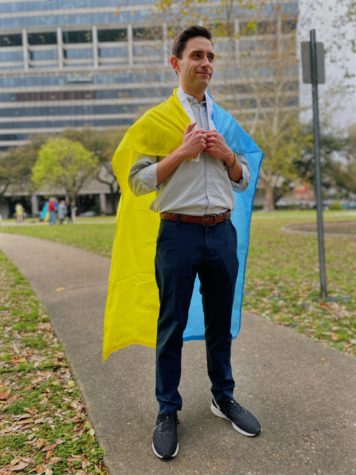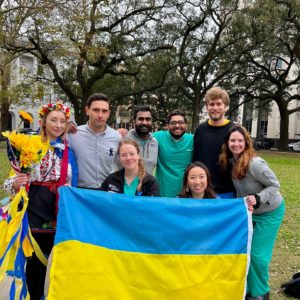World away from Ukraine, Tulane student feels its pain
March 18, 2022

Oleksandr Orak struggled to hold back tears. At a rally for Ukraine last week in Lafayette Square, emotion overtook him as he heard the words in his country’s national anthem: our freedom and glory isn’t gone yet.
He tried to keep singing.
The moment, Orak said, felt like “a call to action.”
Orak is a third year M.D. and MBA student at Tulane University. He lived in Kharkiv, Ukraine until he was 14, and his family moved to Brooklyn, New York.
But now, Orak is working to support his home country from New Orleans — and still worrying about his family in Ukraine.
Orak’s immediate family lives in the U.S., but he has an uncle, cousins and classmates in Ukraine.
Some there have managed to flee. But one cousin, he said, is hunkered down below ground in a subway station in the city of Kharkiv.
His cousin did not want to leave without her husband, who may be needed to join the fight.
Orak keeps in touch with his loved ones as best he can. In their messages, they describe days and nights of “wildly painful” stress.
The moments of quiet are shattered by the sudden sound of rocket fire.
The toughest part, Orak said, is “just not knowing if they’re going to pick up the phone.”
Many in Ukraine are forced to make an agonizing choice: leave home for an exhausting, uncertain journey, or stay and try to find a safe place.
As Russian bombs bring death and destruction to civilians and cities, Orak is determined to help from New Orleans. He started a lapel pin drive of small Ukrainian flags and is planning rallies and fundraising dinners. Orak hopes proceeds will bring life-saving supplies and medication directly to Ukrainian citizens.
“Somebody reaches out to me and says, ‘Hey, I heard about your lapel pin drive, and I heard you guys have, like 3,000 to donate, I’m gonna match that,’” he said. “Then … we use the channels that we develop to bring that to people that need it.”
He wears a braided blue and yellow bracelet on his wrist and a Ukrainian flag pin on his collar.
When Russia launched its attacks, Orak had a hard time “convincing [himself] that what [he’s] seeing is real.”
“It’s been tough,” Orak said.

It was difficult for him to celebrate Mardi Gras because his mind was elsewhere. Orak said focusing on rallies and fundraising and checking in with loved ones has helped. Other Ukrainian-American students have reached out with support too.
Political science professor Christopher Fettweis said he does not see an end in sight.
“It’s entirely possible this thing grinds on for months,” he said.
Fettweis pointed to a few possible reasons for the war.
“But the rise of Putin and his very corrupted authoritarian regime is the most important factor,” Fettweis said.
Expanding NATO’s reach also made Russia paranoid, he said, and the deterioration of U.S.-Russian relations did not help.
For Orak, one way to help is to be aware of disinformation surrounding the war and avoid being subjected to it.
He said anyone in the U.S. should learn how to identify trustworthy sources of information.
Fettweis said he is amazed “that people who should know better, wouldn’t accept things that the Russians say without a few grains of salt.”
Orak said he hopes working with refugees will remain part of his life even as he pursues other career paths. He is both Ukrainian and American and has sometimes wondered if he can speak on behalf of one country or the other.
But ultimately, he said, “this gives us voice and perspective to act as a bridge between these cultures.”
With millions already displaced, Orak said, “it’s going to be surprising if some of them don’t make it out to New Orleans.”
“It may feel like there isn’t much to do,” Orak said, “but pretty much any person has an opportunity to have an impact.”






















Leave a Comment